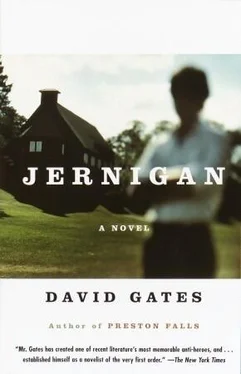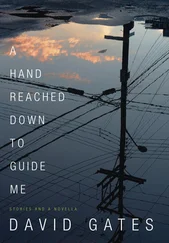Without asking, she poured more coffee into my cup and pushed the milk carton my way. Morning sunlight warming the gray-painted top of the old pine table.
“Anyhow,” she said. “I still think it’s possible to live a more rational life.”
“Quién sabe?” I said. “It’s easy to talk theoretically about the rational life, but when that ole lonesome whistle blows on that ole lonesome 7:48—gal, I just get that ole commutin’ fever in my blood. Cain’t set still nohow.”
“There are ways to make it work,” she said.
“And speaking of work,” I said, looking up at her old electric wall clock. The clock part was set into the belly of a rooster. Why were second hands always red? To tell you, in case you hadn’t fucking figured it out, that seconds went by quickly? Oh, probably just so you could tell the second hand from the minute hand. “The light of common day,” I said, alluding to something or other, “reveals to me that I’ve got about a half hour to collect Danny, drive him over to the bus, get back to the station, find a place in the lot and get my ass onto the platform.”
She looked at the clock. “I had no idea,” she said. “I guess you really better run along. We can talk when you get home, okay?”
Home?
Well, wasn’t I sleeping here most nights? And Danny had pretty much moved in. He’d even insisted on having his birthday party here, such as it was. The four of us and a lopsided chocolate cake from Martha’s unlevelled oven: this was how he chose to turn sixteen. When I’d asked him what friends he wanted there, he just stared me down.
Mornings I dropped him at the corner by Heritage Circle so he could get his old school bus, and he took the same bus back in the afternoon to practice his guitar in the empty house. But he was back by dinnertime. And no wonder. Where would you rather be: Martha’s house with the cooking smells and the corny old braided rugs and the black-and-white tv with the tablecloth thrown over it, or Heritage Circle with the painted walls, cool to the touch and smooth as an eggshell? And, always, that place where the driveway met the street.
On the train, I sat down next to a New York Times , across from another Times and a Bergen Record . Pawed around in my shoulderbag for Northanger Abbey —that’s the one where it turns out the creepy old house isn’t creepy and there aren’t any dark secrets — and found a magazine I certainly hadn’t put there. What the hell was Suburban Survivalist? Same size as Time or Newsweek , with this airbrushed cover of the American Gothic couple, dressed in camouflage fatigues and looming in front of a split-level house, oh so original. Instead of the pitchfork, the geezer with the glasses held a golf club; a kid at their side was sitting at a camouflaged PC. I opened the magazine flat on my lap, so the people across couldn’t see I was reading such a thing, and found “A Letter from the Editor.”
Despite the name, this magazine hopefully isn’t for paranoids or gun nuts — though we do recommend you think about getting a firearm for home protection — but for ordinary folks who want to live more simply without giving up the benefits of the suburban lifestyle. We don’t advocate any radical transformation of society — not that we wouldn’t welcome some improvements! — and we don’t think you should count on it. We’re not into proselytizing. Only you know if you’re discontented enough with the way you’re now living to start making some changes for yourself and your family .
Have you ever been in an old house where the mice have really gotten a foothold? They’ve got their own little spaces behind walls, under floors, above ceilings, secret passages going all over the place. Call us the New American Mice. We can show you the secret ways of getting around everyday suburban America. We’re not about taking over the whole house. We’re about living there on the sly, keeping out of harm’s way, and, hopefully, getting some fun out of it!
Who was this “we,” dangling his hopefullys right and left? The manifesto was signed “Adam Newman,” transparently somebody’s idea of a joke. I paged around and found the masthead: it listed Adam Newman as Editor in Chief, Managing Editor, Art Director, Copy Editor, Business Manager and Ad Sales. The thing was purportedly put out by Orbit Publications, whose address was a post office box in Metuchen and whose logo was a sputnik with a smiley-face and three little curved lines to the right of it to suggest it was moving in a counterclockwise circle.
After “A Letter from the Editor” came “The Rational Life: An Editorial,” by Adam Newman. The rational life according to Adam Newman was spent foraging for unrotted produce in supermarket dumpsters, running a perpetual yard sale, eating rabbits you raised in your basement and making moonshine instead of paying for “government liquor,” all the while taking advantage of such suburban amenities as good schools, relative freedom from crime and squalor, and easy access to cities. All this prefaced by a bunch of boilerplate about soul-killing jobs, the credit trap and the folly of working a lifetime for a retirement you were too old to enjoy.
Then an article about living space — by Adam Newman — which advocated doing all you could to own your own home free and clear so you didn’t have to work to come up with that monthly nut or pay some bank its ruinous interest. Adam Newman seemed to think that could be done by going to sheriff’s sales, or by fixing up an old store or gas station for living quarters. “Architectural distinction,” he wrote, “is where you find it.”
Did you know the first McDonald’s stand, once an eyesore, is now a landmark building? So before you turn up your nose at that flat-roofed cinderblock building (former home of Moe’s TV Repair), remember: it may be a precious specimen of vanishing Americana!
By the time the train got to Penn Station, I’d skimmed the other articles. I read about heating with wood (“Make friends with the guys at your local tree service”), living without a telephone (“If Aunt Tilly dies, Express Mail will still get you to the church on time”) and buying clothes (“Nobody you need to impress will see you rummaging through the shirts at the thrift store”). I sort of liked the fuck-you spirit of it all. But Jesus.
For Martha, though, as I learned that night over dinner, Suburban Survivalist was a trustworthy call to action. One more way you knew she was a little scary, despite the food smells and braided rugs. “But why not?” she said. “Wouldn’t you like to get out of the money economy?”
“Wouldn’t I like to be twenty-four years old and have a twelve-inch dick,” I said. I didn’t want to have to hear how seriously she took all this.
“Perish forbid,” she said, kindly. (Clarissa and Danny, I should have explained, had taken their dinner into Clarissa’s room, or I wouldn’t have been talking about dicks.)
“You know,” I said, “this actually is good.” I’d never tasted moonshine before.
“Tim’s is the best,” she said. “Clarissa and I tried to make our own once.” She gave thumbs-down.
“Quién es Tim?” I said. When I talked Spanish like that, the little Spanish I knew, it was because I thought Spanish sounded streetwise and I was parodying the notion of street wisdom. But it was too many moves. It just sounded crazy.
“You met him,” she said. So she knew a little Spanish too. “At the party? He had on — forget it, men never notice what anybody’s wearing. But he’s sort of tall, glasses?”
I shrugged, dismissing this Tim. Then I remembered. The timber wolf who wasn’t timid. “I mostly remember you,” I said, gallantly.
Читать дальше









![Маргарет Миллар - The Iron Gates [= Taste of Fears]](/books/433837/margaret-millar-the-iron-gates-taste-of-fears-thumb.webp)

